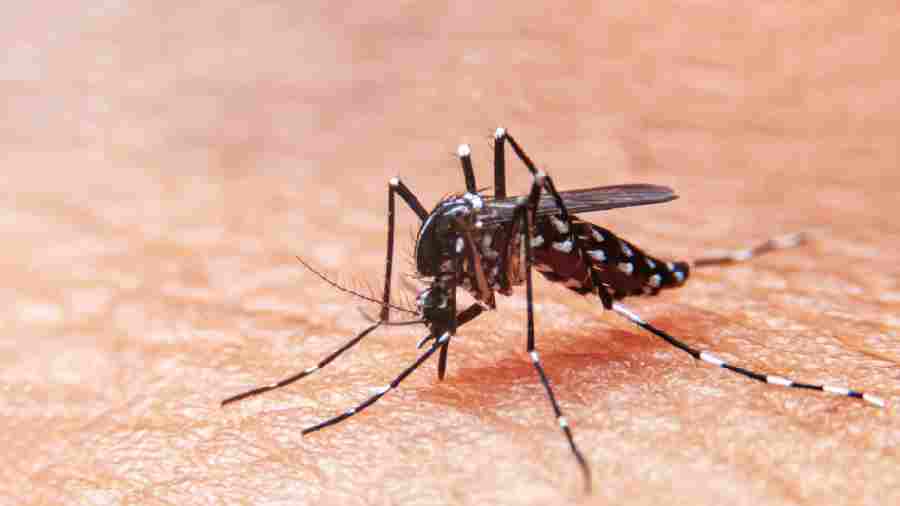
Launch mosquito-control measures when needed the most, says Kolkata health expert
Many Kolkatans said visits by vector-control workers to their neighbourhoods were too infrequent
SANJAY MANDAL, SUBHAJOY ROY | TT | 01.11.22 : The city’s vector-control programme should be reviewed and drastic changes introduced to reduce the number of dengue cases, said a senior official of the state government involved in the fight against the mosquito-borne disease.
Kolkata’s civic workers launch anti-mosquito measures at a time when they are not much effective, while they remain idle when such steps are needed the most, said the official who requested not to be named. The dengue virus is transmitted by the Aedes aegypti mosquito.
“In all the review meetings, Kolkata Municipal Corporation (KMC) officials say they are taking all the measures and there is no lapse on their part. But why are the dengue cases so high in the city? Dengue can be controlled through civic measures and I feel it’s time we reviewed our entire vector-control policy and see whether it is effective,” said the official.
Public health experts have said controlling the mosquito population and destroying breeding sites are the best ways to fight dengue and malaria. The official gave a few examples of what could be wrong in the KMC’s efforts to control the Aedes aegypti population.
“We have come across instances of vector-control workers looking for mosquito larvae during dry seasons and finding nothing. They should launch such drives after a spell of rain,” the official said. Also, he said, an aggressive drive of spraying larvaecide should be undertaken after the monsoon. “Whether that happened this year should be ascertained,” he said.
“Also, the possible sources of Aedes aegypti mosquitoes, such as clogged drains and canals, should be identified before the monsoon and cleaned.”
The official said there could be complacency among some KMC workers at the ground level, which needed to be addressed through various methods of surveillance.
A public health expert who was part of the state government’s team to fight Covid agreed that the vector-control programme should be reviewed.
“There should be proper entomological studies. Also, the civic authorities in and around Calcutta need to find out whether the Aedes aegypti mosquito has become resistant to larvaecides,” he said.
According to the health expert, dengue is essentially considered as an urban disease.
Mayor says residents key to dengue fight, public point ‘inadequate action’ finger at KMC
NEWS
Mayor says residents key to dengue fight, public point ‘inadequate action’ finger at KMC
“A few years ago, Kolkata and its surroundings would record the maximum number of dengue cases. But now we are having a large number of cases in districts, too. This also needs to be reviewed with the help of entomological studies,” he said.
According to the state government’s data, 596 people tested positive for dengue across the state on Monday.
In all, 3,368 samples were tested during the day. Chandramouli Bhattacharya, an infectious disease expert at Peerless Hospital, said that it was impossible to eradicate dengue but proper civic measures could reduce the number of cases.
“The biggest challenge against the Aedes aegypti mosquito is that it breeds almost everywhere, wherever there is stagnant water. So, it is impossible to eradicate the disease, as proven in various countries. However, with proper civic measures and responsible behaviour by residents, it can be controlled,” he said.
KMC officials claimed they are doing everything according to the protocol.
“We hold weekly review meetings with doctors who head boroughs. All issues are discussed at those meetings. We have 930 teams to undertake vector-control work across the city. Regular reports on how many mosquito-breeding sites were found,the places where they were found and several other details are sent to Nabanna,” said a senior official of the KMC.
But many Kolkatans said visits by vector-control workers to their neighbourhoods were too infrequent.
A resident of Kasba said a vector-control team had last inspected their locality before the Puja.
A resident of Raipara Bylane in Sinthee said he had not seen any vector-control worker in months.
An entomologist said such long intervals defeat the purpose of door-to-door visits because an egg of the Aedes aegypti mosquito takes seven days to turn into an adult mosquito.

0 Response to "Launch mosquito-control measures when needed the most, says Kolkata health expert"
Post a Comment
Disclaimer Note:
The views expressed in the articles published here are solely those of the author and do not necessarily reflect the official policy, position, or perspective of Kalimpong News or KalimNews. Kalimpong News and KalimNews disclaim all liability for the published or posted articles, news, and information and assume no responsibility for the accuracy or validity of the content.
Kalimpong News is a non-profit online news platform managed by KalimNews and operated under the Kalimpong Press Club.
Comment Policy:
We encourage respectful and constructive discussions. Please ensure decency while commenting and register with your email ID to participate.
Note: only a member of this blog may post a comment.